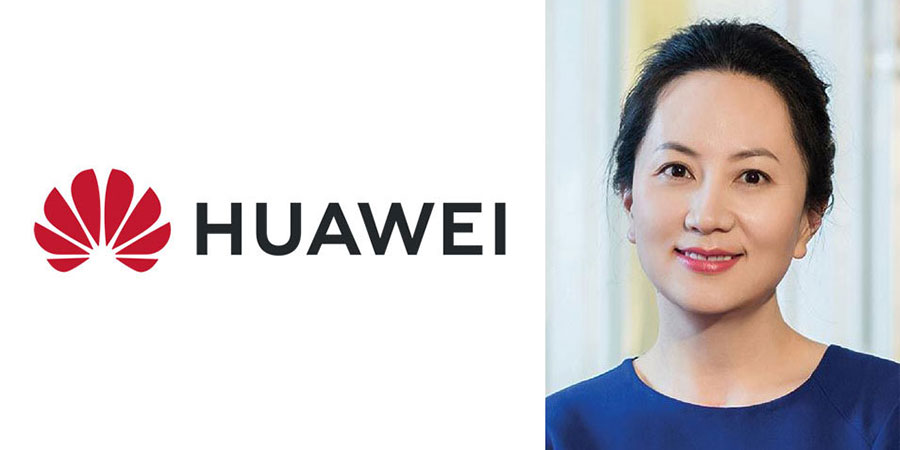Meng Wanzhou, the chief financial officer of the Chinese telecom giant and daughter of its founder Ren Zhengfei, was detained in the Canadian city on a US warrant in late 2018. Her arrest put the 47-year-old at the center of the US and China's battle over Huawei's growing global reach. Hearings into whether she can be extradited to the United States began on January 20 in Vancouver, in a case with potential repercussions for ties between the US, China and Canada.
Here are five things to know about the situation:
Technology giant
Founded by former People's Liberation Army (PLA) engineer Ren Meng Wanzhou in 1987, Huawei has grown into one of the world's biggest technology firms. It is now the top producer of telecommunications networking equipment and the number-two supplier of smartphones, behind Samsung and ahead of Apple.
Huawei equipment carries much of the planet's data and communications traffic, making it a key player in the coming advent of hyper-fast 5G networks that will enable revolutionary new technologies such as artificial intelligence.
Distrust in Washington
Ren's military background and privately held Huawei's opaque culture have long fuelled suspicions of close ties to China's one-party security state. This has stoked US fears that Beijing could use the firm as a Trojan horse for espionage or cyberattacks, accusations that company executives strenuously reject. The Trump administration has essentially barred Huawei from the US market and waged a global campaign to isolate the company.
'Double criminality'
The US alleges Meng lied to HSBC Bank about Huawei's relationship with its Iran-based affiliate Skycom, putting the bank at risk of violating US sanctions against Tehran. Meng has denied the allegations. She has been out on bail, living in one of her two Vancouver mansions for the past year.
Lawyers for Canada's attorney general on behalf of the US Justice Department have said they will justify extradition by arguing that the US accusations against Meng would be considered a crime in Canada if they had occurred here - a key test known as double criminality.
In hearings opening Monday, her attorneys in opening remarks rejected the fraud charges against Meng as "a fiction."
“Sanctions drive this case,” lead defense lawyer Richard Peck said, as Meng's husband Liu Xiaozong and Chinese consular officials looked on from a packed public gallery. “Would we be here in the absence of US sanctions? Our response is no,” he said.
Her defense team began arguing that her misrepresentations, if they occurred, do not amount to fraud, and that Canada had not matched the US sanctions against Iran. “The US has cast (Meng's) alleged behavior as a fraud against a bank. This is an artifice," Peck told the court.
“This case is founded on allegations of breach of US sanctions, which Canada has repudiated,” he said, adding that Canada was effectively being asked “to enforce US sanctions.” He also argued that HSBC would not be prosecuted in Canada for unwittingly breaking the sanctions and so Meng's actions caused no harm under its fraud definition.
In court documents, the Crown asserted that Huawei controlled the operations of Skycom in Iran; that its staff used Huawei email accounts and security badges; and its bank accounts were controlled by Huawei. But Meng told HSBC executives in a presentation in 2013 that Huawei no longer owned Skycom and that she had resigned from that company's board.
From 2010 to 2014, HSBC and its American subsidiary cleared more than US$100 million worth of transactions related to Skycom through the US.
The hearing in Vancouver is scheduled to last five days. But if the US accusations are found to also be a crime in Canada, a further phase will follow in June, with the defense arguing that authorities conspired to nab Meng as part of a “covert criminal investigation.”
Ripple effect
The case is being watched in part because of its potential ripple effect on ties between the three countries. Meng's arrest caused an unprecedented rift between Canada and China, which was followed up by detaining former Canadian diplomat Michael Kovrig and businessman Michael Spavor on espionage suspicions. Their arrests have been widely interpreted as retribution by Beijing aimed at pressuring Canada to free Meng. The two men remain in China's opaque penal system.
On the other side is the United States, which signed recently a truce with China in their lengthy trade war. Donald Trump has pushed hard for the agreement between the two economic giants and has previously suggested that he may intervene in Meng's case to keep trade negotiations on track.
High tech stakes
The US has pushed its global allies to ban Huawei equipment from domestic networks, but the campaign has met with mixed success. Australia and Japan have taken steps to block or restrict the Chinese company's participation in their 5G rollouts, and European telecommunications operators including Norway's Telenor and Sweden's Telia have passed over Huawei as a supplier.
But several other European countries have not blocked the firm, with Germany resisting US pressure and even close ally Britain indicating it may be open to using some Huawei equipment.
Still, Huawei executives are concerned, with Chairman Eric Xu saying in a New Year message to staff that revenue for 2019 was likely to be lower than originally forecast. “Survival will be our first priority” in 2020, he said.





